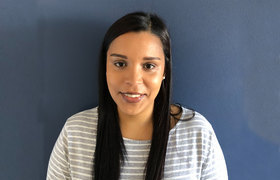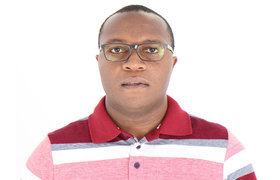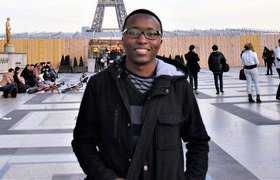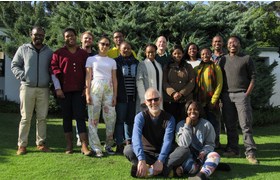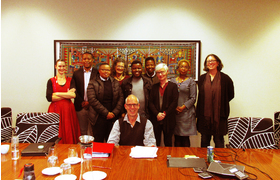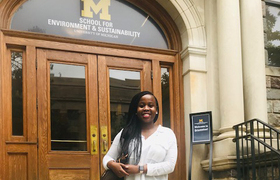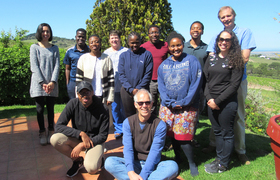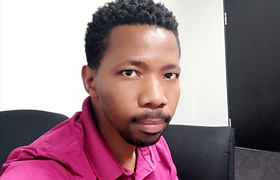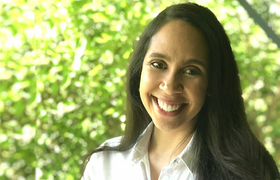Musa Nxele: Paris, Parish and a PhD
29 April 2020 | Story Musa Nxele. Photo Supplied. Read time 5 min.
Musa Nxele, from the Nelson Mandela School of Public Governance in the Faculty of Commerce, has just returned from Paris, France, after spending some months studying towards his PhD. He is registered with both the University of Cape Town (UCT) and the University of Paris 1. Nxele was awarded a study grant by Campus France, a French government agency for the promotion of higher education, international student services and international mobility. Here he reflects on his recent visit.
“In October 2019 I left Cape Town for Paris to spend obligatory time at the University of Paris 1 working on my PhD. Did I manage to come back before the coronavirus hit? I will leave readers on the edges of their seats before giving the answer,” he said.
Before Nxele left, there was a lot of uncertainty about whether he’d be able to get to Paris. The day before he was due to leave, his funder informed him that his flights were booked, his visa was to be issued on his way to the airport, and that accommodation would be booked when he arrived.
“Not being one to trust easily, it was a hard decision to step into the plane and potentially risk being temporarily homeless and destitute in Paris.”
“It was a hard decision to step into the plane and potentially risk being temporarily homeless and destitute in Paris.”
Being booked to stay in Paris for a few months, with the ‘agile’ plan as a guide, Nxele decided to pack light – a cabin suitcase and a slim laptop backpack.
“The last thing I wanted was to both be lost (I always get lost!) and drag a big heavy bag in Paris. I call this part of the story Paris.”
Only a few people know why Paris has a special place in his heart, Nxele said.
“While pursuing a master’s degree in Paris six years ago, I met a love of a different type. I fell for a church. (The hippy plan sure sounds better now, huh?) It was not for its architectural physic, being a small Baptist church just outside Paris, in Rueil-Malmaison; I fell for the people, their passion and their food.”
Church and community
Back then, he said, he would travel an hour to get to this church, which he found via Google.
“The people were so welcoming, so united, so happy [and] authentic. Every Sunday we sat for a meal after church, always cooked with weight and meaning. We met often during the week, for more food in homes, movies and great chats. I felt the ground beneath my feet, for the first time, in a foreign country that sounds like French. I never had this in South Africa.”
This time around, the first time that he walked back in, Parker, the pastor, preached a sermon on a man who found a land with treasure, and in joy went off to sell everything he owned to buy the land.
“He titled his sermon ‘Worth every penny’. It sure was. I call this part of my story Parish.”
“Passion takes me to terrifying places.”
Nxele’s study regime in Paris was demanding. He had a lot of ground to cover on his PhD. Being overly ambitious, he said, he picked a topic that required a lot of data collection, riddled with lots of uncertainty.
“But passion takes me to terrifying places. I mostly get embarrassed because [I had] quite a lot fails, but it makes for a stressful and potentially rewarding life.”
He presented elaborate plans to his supervisors and worked for hours with dead ends.
“I walked a lot too because there was a big labour strike for weeks that brought public transport to a halt. I got lost quite a bit, even on my way to familiar places. I used a GPS to drive home, so you can imagine.”
Nxele said he beat the COVID-19 travel ban and arrived back in Cape Town in February.
“Beyond my safe return I don’t have much to report other than I worked a lot. I don’t have a lot to show for it yet so I am [low-key] freaking out. This part of the story I call, very aptly, the PhD.”
 This work is licensed under a Creative Commons Attribution-NoDerivatives 4.0 International License.
This work is licensed under a Creative Commons Attribution-NoDerivatives 4.0 International License.
Please view the republishing articles page for more information.
New Generation of Academics Programme (nGAP)
UCT has responded energetically to the New Generation of Academics Programme (nGAP), an opportunity provided by the Department of Higher Education (DHET) to build a new generation of black South African academics. The DHET’s 2015 vision document, “Staffing South Africa’s Universities Framework: A comprehensive, transformative approach to developing future generations of academics and building staff capacity”, proposes a suite of initiatives to address the challenge, with nGAP being the major instrument to increase the numbers of black South African academics.
The programme “involves the recruitment of highly capable scholars as new academics, against carefully designed and balanced equity considerations and in light of the disciplinary areas of greatest need”. The nGAP scholars are appointed into permanent positions where from the outset their conditions are customised to ensure their successful induction into the ranks of established academics.
The DHET provides funding over a six-year period to support the appointment of an nGAP lecturer, and their time is protected to provide the best possible opportunity for the completion of a doctorate degree in the shortest possible time. Once the degree is completed, the nGAP lecturer’s teaching commitments are steadily increased until they shoulder a full teaching load.
Since the first advertisement for nGAP posts in 2015, UCT has been awarded 17 nGAP positions: 5 (Phase 1), 4 (Phase 2), 3 (Phase 3) and 5 (Phase 4). These are distributed across all faculties.
UCT’s nGAP scholars operate as a single cohort, managed and coordinated by Dr Robert Morrell. Lecturers meet for quarterly meetings, writing retreats and various capacity-building activities all designed to support the completion of postgraduate qualifications (particularly doctorates) and to develop records of achievement that will testify to their emergence as self-standing, excellent academics. Each lecturer is mentored by a senior scholar, who provides support and guidance on the challenges that routinely face academics.
The nGAP manager sets great store in building the cohesion of the cohort and encouraging the establishment of new UCT networks while producing a collaborative, mutually supportive and embracing work culture.
According to Dr Morrell, “This group of academics will lead UCT in 15 to 20 years’ time ... Their vision of excellence, of being African and South African, of serving a wider community and producing knowledge for the planet, the continent and the country, will power UCT in years to come.”
Newsletters
In the news
